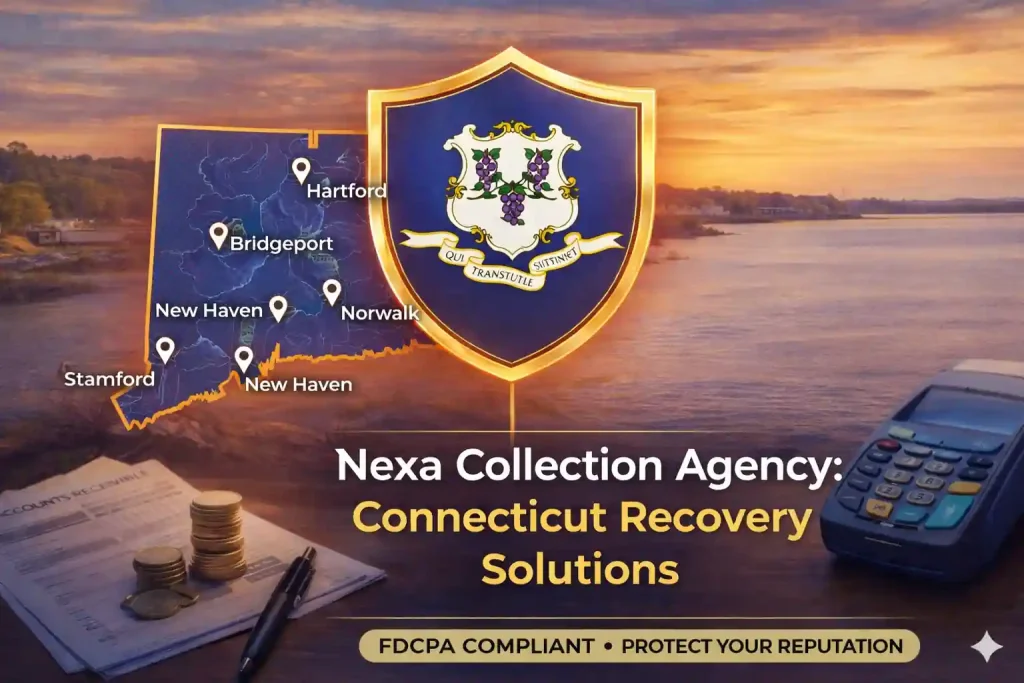
Connecticut Revenue Recovery: Navigating the “Nutmeg State” Compliance Shift
In Connecticut’s sophisticated economy—from the financial centers of Stamford and Hartford to the healthcare networks of New Haven—cash flow is the lifeblood of business. However, with health insurance premiums rising by 16.8% in 2026 and the state’s aggressive new consumer protections, “old school” collection tactics are now a major liability.
Whether you are a Fairfield County specialty practice or a Hartford-based B2B firm, Nexa provides the localized, compliant expertise needed to recover revenue without triggering Connecticut’s heavy “unfair trade practice” penalties.
Nexa provides 100% reputation-safe, 50-state collections with free credit reporting, free litigation and bankruptcy scrubs, and zero hidden or onboarding fees. Secure – SOC 2 Type II & HIPAA compliant.
Need a Collection Agency? Contact us
The Connecticut Legal Landscape: The 2026 Rulebook
Connecticut law rewards creditors who understand the “Protected Floors.” If your agency doesn’t know the 2026 minimum wage, they are likely wasting your time on “judgment-proof” accounts.
| Debt Type | Statute of Limitations | Key Regulation |
| Written Contracts | 6 Years | C.G.S. § 52-576 |
| Oral Contracts | 3 Years | C.G.S. § 52-581 |
| Medical Debt | Reporting Ban | Public Act 24-6 |
| Weekly Wage Exemption | $677.60 | Based on $16.94/hr SMW |
Critical 2026 Compliance Note: Under Public Act 24-6, any medical debt reported to a credit rating agency in Connecticut is void and unenforceable. Furthermore, as of October 2025, providers cannot require electronic payment info (credit cards/bank accounts) as a condition of care. Nexa’s “Mediation-First” engine is built for this restricted environment.
Industry-Specific Solutions for Connecticut
1. Medical & Dental: The “Mediation-First” Model
With the credit reporting ban, you’ve lost your biggest “stick.” Aggressive tactics now carry heavy CUTPA (CT Unfair Trade Practices Act) penalties.
-
The Problem: Patients know their credit can’t be hit for medical bills. This has led to a surge in “strategic non-payment.”
-
The Nexa Solution: We are 100% HIPAA compliant and PA 24-6 experts. We use professional mediation and insurance follow-ups to secure revenue without ever touching a credit report, protecting your practice from the “Void Debt” penalty.
2. B2B & Finance: Navigating the $677 Floor
Hartford and Stamford businesses face a high cost of living, which means higher “exempt” income for debtors.
-
The Problem: In 2026, you cannot garnish a debtor’s wages unless they take home more than $677.60 per week (40x minimum wage).
-
The Nexa Solution: We offer Free Litigation & Bankruptcy Scrubs. We identify upfront which debtors are “judgment-proof” so you don’t waste legal fees on a garnishment that will be denied by the court.
Why Connecticut Businesses Choose Nexa
-
Zero Onboarding Fees: No setup costs or hidden monthly “tech fees.”
-
Free Data Scrubbing: We provide litigation and bankruptcy filters at no cost to you.
-
CUTPA Shield: We handle the mandatory state disclosures, protecting you from $25,000-per-violation penalties.
-
50-State Skip Tracing: We track debtors who move to NY, MA, or FL using our national network.
Connecticut Success Stories
Scenario 1: The “New Haven Multi-Specialty Group”
-
Problem: $150,000 in aging receivables. The previous agency was still threatening credit reporting, risking a total loss of the debt under PA 24-6.
-
Strategy: Nexa audited the accounts, removed illegal threats, and implemented a compliant “Reputation-Safe” mediation program.
-
Result: $92,000 recovered in 90 days with zero legal exposure.
Scenario 2: The “Hartford B2B Firm”
-
Problem: A $35,000 unpaid invoice from a vendor who moved to New York.
-
Strategy: Nexa used its 50-state skip-tracing to track the assets in NY and leveraged a litigation scrub to confirm collectability.
-
Result: Full principal recovery within 40 days.
Restart Your Connecticut Cash Flow Today
Don’t let your revenue vanish into the 2026 compliance gap. Stop the “Nutmeg Stall.”
Get a Free Connecticut Recovery Analysis & Data Scrub
Industries We Serve in Connecticut
Nexa provides specialized recovery tailored for the Public Act 24-6 reporting ban:
-
Medical & Dental: HIPAA-safe recovery bypassing the state’s total credit reporting ban.
-
Finance & Insurance: High-value recovery for the Hartford and Stamford financial sectors.
-
B2B & Manufacturing: Specialized mediation for industrial and commercial suppliers.
-
Construction: Navigating mechanics liens and securing revenue for local contractors.
-
Professional Services: Fee recovery for legal, accounting, and consulting firms.
-
Small Business: Protecting cash flow for local retail and service providers.
Popular Cities:
